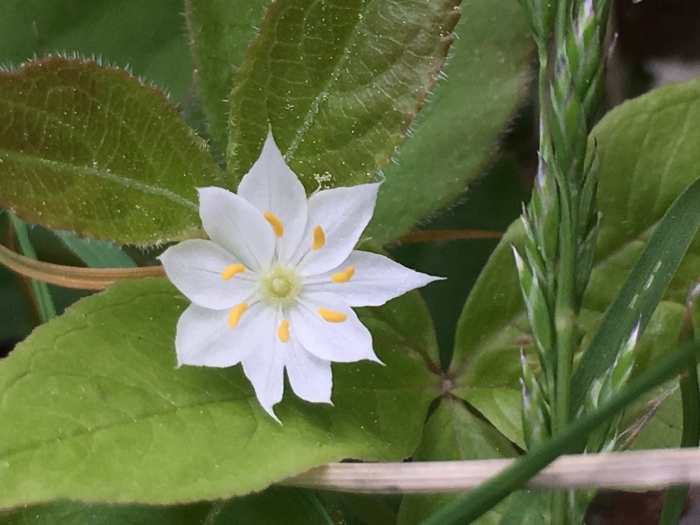Starflower
(Lysimachia borealis)
Starflower (Lysimachia borealis)
/
/

Mathew Zappa
CC BY 4.0
Image By:
Mathew Zappa
Recorded By:
Copyright:
CC BY 4.0
Copyright Notice:
Photo by: Mathew Zappa | License Type: CC BY 4.0 | License URL: http://creativecommons.org/licenses/by/4.0/ | Rights Holder: Mathew Zappa | Publisher: iNaturalist | Date Created: 2016-06-07T19:07:38Z |

















































Estimated Native Range
Summary
Lysimachia borealis, commonly known as Starflower, is a deciduous perennial herb native to cool, moist, deciduous forests and coniferous woodlands in Eastern North America. It typically grows to about 20 cm (8 in) in height, with creeping rhizomes that give rise to vertical stalks. Each stalk boasts a whorl of 5–9 lanceolate leaves at its apex, and one or two white, star-shaped flowers emerge on slender stalks from the center of the leaf whorl. The flowers, about 15 mm (1⁄2 in) across, have five to nine petals and bloom between May and June, offering a delicate appearance.
Starflower is valued for its understated beauty and ability to thrive in shaded conditions, making it an excellent choice for woodland gardens, shade gardens, and naturalized areas. It is also used as a ground cover due to its spreading habit. This plant prefers consistently moist, well-drained soils rich in organic matter and can tolerate a range of light conditions from full sun to part shade. While generally low-maintenance, it can be susceptible to root rot if drainage is poor.CC BY-SA 4.0
Starflower is valued for its understated beauty and ability to thrive in shaded conditions, making it an excellent choice for woodland gardens, shade gardens, and naturalized areas. It is also used as a ground cover due to its spreading habit. This plant prefers consistently moist, well-drained soils rich in organic matter and can tolerate a range of light conditions from full sun to part shade. While generally low-maintenance, it can be susceptible to root rot if drainage is poor.CC BY-SA 4.0
Plant Description
- Plant Type: Herb
- Height: 0.3-0.7 feet
- Width: 0.214-0.5 feet
- Growth Rate: Moderate
- Flower Color: White
- Flowering Season: Spring, Summer
- Leaf Retention: Deciduous
Growth Requirements
- Sun: Part Shade, Full Sun
- Water: Medium, High
- Drainage: Medium
Common Uses
Bee Garden, Bird Garden, Butterfly Garden, Deer Resistant, Hummingbird Garden, Low Maintenance, Rabbit Resistant
Natural Habitat
Cool, moist, deciduous forests and coniferous woodlands in Eastern North America
Other Names
Common Names: American Starflower, Maystar, Northern Starflower, Trientale Boréale
Scientific Names: , Trientalis borealis, Lysimachia borealis, Trientalis europaea, Trientalis americana, Trientalis borealis subsp. borealis, Trientalis borealis f. pluriverticillata, Lysimachia trientalis var. americana, Trientalis borealis f. borealis, Trientalis borealis f. ramosa
GBIF Accepted Name: Lysimachia borealis (Raf.) U.Manns & Anderb.